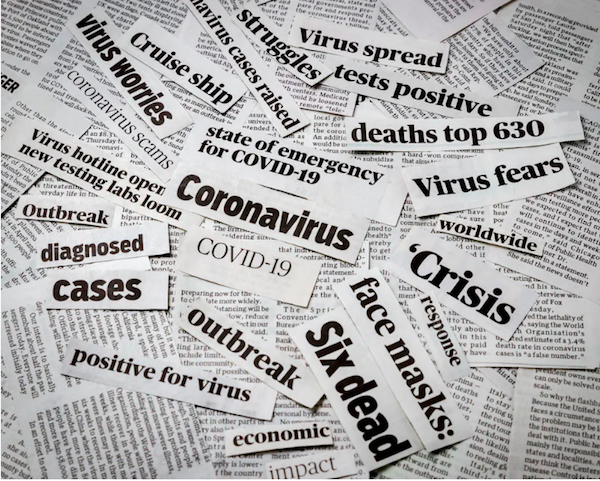The media’s coverage of COVID-19 is being questioned as the disease sweeps across the world. The pandemic has severely tested national health systems and is wreaking havoc on economies and ordinary lives. How can the media constructively communicate the urgency and severity of pandemics without contributing to a climate of fear and panic?
This question is especially pertinent to African news media given that international news flow has historically remained in favour of the developed world. In this context, how can African journalism negotiate its place – and the continent’s interests – in the global news narrative? How can African journalism highlight the continent’s challenges and vulnerabilities, which are often ignored by internationalised responses?
The COVID-19 pandemic threatens hundreds of thousands of lives across borders. International travel as result of tourism, migration and business makes Africa a part of the international circuit of leisure and trade. The inter-relatedness of world economies makes coverage of the spread and impact of the virus in Europe, China and the US vitally important to African newsrooms and audiences. When Western and Eastern economies are hit Africa’s will be, too.
Yet one must ask how inclusive the coverage of the international response to the pandemic has been. And what role African news media should be playing in ensuring responses to the epidemic work for the continent.
My fear is that Africa’s news media is abdicating its responsibilities by not questioning the appropriateness of the global response to the crisis. It is failing to address practical, historical, cultural and political questions around the interventions aimed at stopping the spread of COVID-19.
Instead, the continent’s media appear to be reproducing internationalised narratives. These, in turn, are feeding policy interventions that are not likely to mitigate this crisis. They are in fact likely to exacerbate it.
Fundamentally, African journalism must ask itself whether it is largely irrelevant or simply incapable of constructing or shaping an international news narrative that recognises the continent’s challenges and interests.
Lessons from Ebola
The operations of the World Health Organisation (WHO) reflect its funding profile as well as the uneven power relations that characterise the international world order. WHO guidelines on pandemics tend to internationalise interventions that ignore the variable experiences of a large part of the world.
Efforts to get the Ebola epidemic under control in West Africa are a case in point. Interventions began to work only after local communities reframed the WHO’s containment guidelines.
Experts have argued that the adoption of international guidelines relating to the disposal of bodies of Ebola victims failed because they didn’t recognise the strength of local cultural practices. People thus put themselves at great risk to give the departed dignified burials.
The local media played an important role in communicating these cultural details.
The continent’s media should learn from these experiences in its coverage of the the COVID-19 pandemic and its mitigation.
Besides being the principal purveyors of public information, the news media in these countries are key to shaping government policy.
The WHO has urged the public to implement a number of measures. These have included social distancing and self-isolation. In addition, governments are increasingly imposing quarantines. These measures have been legitimised by the international news media. They’ve also been reproduced largely uncontested across Africa – from Johannesburg to Nairobi to Lagos.
Unsurprisingly therefore, governments across the continent have instituted the WHO guidelines and followed in the footsteps of Europe, China and the US.
The African media has failed to develop an alternative narrative encouraging the WHO and governments to ensure measures are appropriate for local conditions.
For example, social distancing, self-isolation and quarantines are largely impractical in a number of African countries. In an environment in which most people get their food and other daily needs from open air informal markets, it is remarkably ironic that local media should concentrate on panic buying and the provision of sanitisers in the supermarkets in Nairobi and Johannesburg’s leafy suburbs.
Similarly, how does one self-isolate in the context of Nairobi’s sprawling slums? There, a single room is shared by family and extended kin. How do you agree to a quarantine when you have lived under a surveillance state you are deeply suspicious of in Uganda, Zimbabwe and Rwanda? Indeed the immediate cultural inflection associated with quarantine is detention. It does not imply safety.
In addition, how can the African news media fail to point out the fallacy of state directives for people to work from home, with no prospects of any financial support when 85% of the population work in the informal sector?
Stigma
The African coverage of the AIDS pandemic in the 1980s was fraught with narratives of death and doom. This created a dangerous climate of stigma. That, in turn, hindered effective public health messaging. The result was that hundreds of thousands of Africans died.
This history of stigma, a most dangerous enemy in viral disease containment, has never been addressed. In the current climate it’s the media’s responsibility to demolish the myth that COVID-19 is a foreign killer virus akin to AIDS. Legitimising this myth inevitably mobilises a popular history that will hinder the fight against the spread of the virus.
George Ogola, Reader in Journalism, University of Central Lancashire
This article is republished from The Conversation under a Creative Commons license. Read the original article.














